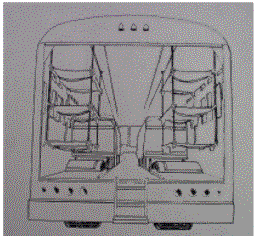| Bus ambulances are best suited for moving
larger numbers of casualties over improved roads for relatively short
distances.
These bus ambulances are configured in a number of ways, but all can
hold large numbers of litter and ambulatory patients.
Litters are supported from the ceiling, sides and floor of the bus.
Loading is normally from the front of the bus to the rear, and from the
top rack to the bottom.
Patients are normally positioned with their heads toward the front of
the bus, but sometimes the nature of their injuries will cause you to
change the normal positioning.
Unloading is in reverse order: from the bottom to the top and from the
rear toward the front of the bus. |


|
For more information, read FM 8-10-6 Medical Evacuation in a Theater of Operations
*From Operational Medicine
2001, Health Care in Military Settings, NAVMED P-5139, May 1, 2001, Bureau
of Medicine and Surgery, Department of the Navy, 2300 E Street NW,
Washington, D.C., 20372-5300
|
|
|
This information is provided by The Brookside Associates. The Brookside
Associates, LLC. is a private organization, not affiliated with any governmental
agency. The opinions presented here are those of the author and do not
necessarily represent the opinions of the Brookside Associates or the Department
of Defense. The presence of any advertising on these pages does not constitute
an endorsement of that product or service by either the US Department of Defense
or the Brookside Associates. All material presented here is unclassified.
C. 2009, 2014, All Rights Reserved
 |
|


